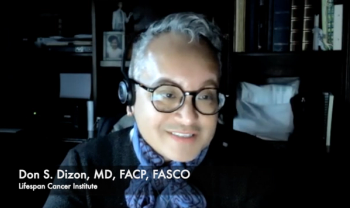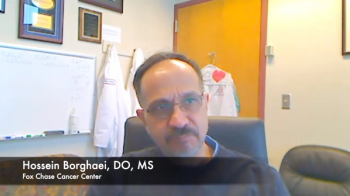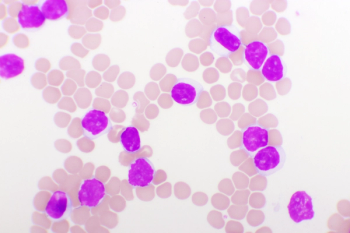
Late-stage cancer and poor outcomes for patients may occur as a result of low screening numbers during the COVID-19 pandemic.

Your AI-Trained Oncology Knowledge Connection!


Late-stage cancer and poor outcomes for patients may occur as a result of low screening numbers during the COVID-19 pandemic.

Breast cancer survivors who are minorities or medically underserved appear to experience a benefit in health-related quality of life after taking part in a community-based physical activity program.

As the year 2021 comes to a close, CancerNetwork® reviews ongoing clinical research and upcoming innovations in the non–small cell lung cancer space.

Don Dizon, MD, FACP, FASCO, discusses the need to improve treatment strategies for transgender patients with cancer.

Investigators identified an association between the early expansion of Medicaid and a reduction in cancer-related mortality.

One in 3 nurses do not feel emotionally health, a large number of whom have experienced trauma due to the COVID-19 pandemic and no longer wish to be in their job position.

Aparna Parikh, MD, MS, discusses how her early experiences with physical fitness shaped her current relationship with exercise.

Investigators have identified a gap in end-of-life care among patients with cancer who are dual eligible for Medicare and Medicaid.

A secondary analysis of a clinical trial indicated that women who were human immunodeficiency virus–positive and underwent loop electrosurgical excision procedure for cervical intraepithelial neoplasia had an increased likelihood of clearing high-risk human papillomavirus than women who underwent cryotherapy.

The Build Back Better Act could increase drug and related expenses could eventually lead to the closure of independent oncology practices.

CancerNetwork® spoke with Allyson J. Ocean, MD, Diane M. Simeone, MD, Manuel Hidalgo Medina, MD, PhD, and Andrew E. Hendifar, MD, about their recent research into the treatment of pancreatic cancer.

Diane Simeone, MD, spoke to the need to determine which patients are at risk of developing pancreatic cancer, the importance of early detection, and challenges that need to be addressed in order to improve survival.

Patients with stage IV breast cancer who received a systemic therapy plus surgery experienced a higher survival benefit than those receiving systemic treatment alone.

CancerNetwork® sat down with Hossein Borghaei, DO, MS, to talk about keeping track of conference and journal updates to help build and maintain knowledge around lung cancer.

For Pancretic Cancer Awareness month, CancerNetwork® spoke with Manuel Hidalgo Medina, MD, PhD, about the importance of the phase 2 COMBAT/KEYNOTE-202 trial examining motixafortide and pembrolizumab plus nanoliposomal irinotecan, fluorouracil, and folinic acid in metastatic pancreatic ductal adenocarcinoma.

Patients with advanced renal cell carcinoma who received first-line nivolumab and ipilimumab experienced an improved treatment-free survival vs sunitinib.

Retrospective data suggest survival outcomes were positive and safety was reasonable for patients with cancer aged 80 years or older who received immune checkpoint inhibitors.

A exposure-response analysis indicated that a 3.2mg/m2 dose of lurbinectedin every 3 weeks achieved a favorable risk/benefit profile in patients with small cell lung cancer.

Patients with relapsed chronic lymphocytic leukemia who were treated with either limited or continuous venetoclax and rituximab experienced improved responses during a 5-year follow-up.

Patients with non-muscle invasive bladder cancer unresponsive to Bacillus Calmette-Guerin may benefit from treatment with CG0070 plus pembrolizumab.

Findings from a Nationally Representative study indicated that multispecialty, academically affiliated, urban cancer institutions had more access to genetic testing.

The FDA approved nab-sirolimus as the first drug specifically indicated for the treatment of patients with malignant perivascular epithelioid cell tumors.

Don Dizon, MD, FACP, FASCO, describes the importance of establishing a gender-affirming environment for patients with cancer.

In a systemic review assessing the use of first-line post-protocol immunotherapy for patients with kidney cell carcinoma, investigators reported that use was low in randomized clinical trials among patients in the control group.

Patients with EGFR-mutated non-squamous non–small cell lung cancer who progressed following EGFR-TKI therapy experienced a progression-free survival benefit following treatment with sintilimab plus a bevacizumab biosimilar injection and chemotherapy.

Investigators announced positive topline results for the phase 3 QuANTUM-First trial, assessing the use of quizartinib plus chemotherapy for adult patients with newly diagnosed FLT3-ITD–positive acute myeloid leukemia.

Lead author, Quirin Zangl, MD, spoke with CancerNetwork about research published in the journal ONCOLOGY focusing on the importance comprehensive geriatric assessment tools for patients with genitourinary carcinomas.

Don Dizon, MD, spotlights the daunting experiences lesbian, gay, bisexual, and transgender patients with cancer face, tracing that experience from diagnosis throughout treatment and continuing into symptom management.

Most states in the United States had stable rates of lung cancer screenings during the COVID-19 pandemic, with some even experiencing significant improvements.

CancerNetwork® sat down with Hossein Borghaei, DO, MS, to talk about coming research involving immunotherapy for patients with lung cancer.